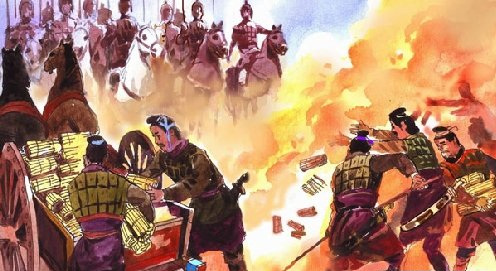(单词翻译:单击)
Burning of Books and Burying of Scholars
焚书坑儒
1. Book burning
1、焚书
According to the Records of the Grand Historian, after the First Emperor of Qin annexed the State of Qi and unified China in 221 BC, his Chancellor Li Si suggested suppressing the freedom of speech, unifying all thoughts and political opinions.
根据《史记》的记载,秦始皇吞并齐国并一统中国之后,他的丞相李斯建议压制演讲的自由,统一思想和政见。
This was justified by accusations that the intelligentsia sang false praise and raised dissent through libel.
这个建议被指责知识分子阿谀奉承和进行文字诽谤的论点证明了它的合理性。
Beginning in 213 B.C, all classic works of the Hundred Schools of Thought----except those from his own, the school of philosophy known as Legalism----were subject to burning.
公元前213年开始,百家争鸣的所有典籍,除了他所尊崇的法家学说以外,全部被焚烧。
Li Si proposed that all histories in the imperial archives except those written by the Qin historians be burned;
李斯建议帝国档案馆里的所有史料,除去秦朝历史学家所撰写的,都应该被烧毁;
that the Classic of Poetry, the Classic of History, and works by scholars of different schools be handed into the local authorities for burning;
包括《诗经》、《书经》和那些由诸子百家所写的著作都应被收至中央进行焚烧;
that anyone discussing these two particular books be executed;that those using ancient examples to satirize contemporary politics be put to death, along with their families;
任何人谈论这两本书都应被处死,任何人用过去的例子来讽刺当朝的政治都应被处死,他们的家人也应被行刑;
that authorities who failed to report cases that came to their attention were equally guilty;
朝廷中有任何人知情不报同样该被治罪;
and that those who had not burned the listed books within 30 days of the decree were to be banished to the north as convicts working on building the Great Wall.
那些没有按圣旨在30天内焚烧名单上书籍的人应被发配到北疆和犯人们一起修建长城。
The only books to be spared in the destruction were books on medicine, agriculture and divination.
在焚书期间唯一得以流传的书籍是有关医药、农业和占卜的。

2. Burial of the scholars
2、坑儒
After being deceived by two alchemists while seeking prolonged life, the First Emperor of Qin ordered more than 460 of them in the capital to be buried alive in the second year of the proscription, though an account given by Wei Hong in the 2nd century added another 700 to the figure.
自从在寻找长生不老方法的过程中被两个炼金术士欺骗,秦始皇在放逐他们的第二年就在都城活埋了超过460个儒家学者,不过2世纪时卫宏又为这个数据增加了700个人。
The Crown Prince Fusu counseled that, with the country newly unified, and enemies still not pacified, such a harsh measure imposed on those who respect Confucius would cause instability.
太子扶苏劝谏说,对于一个刚刚统一的国家,外敌还未平定,对尊崇孔子学说的那些人采取这样严酷的刑法会造成不稳定。
However, he was unable to change his father’s mind, and instead was sent to guard the frontier in a de facto exile.
但是,他不仅无法改变秦始皇的想法,甚至还被发配至边疆充军。
The quick fall of the Qin Dynasty was attributed to this proscription.
秦朝如此快速的覆灭就源于这些对于人权的剥夺。
Confucianism was revived in the Han Dynasty that followed, and became the official ideology of the Chinese imperial state.
儒学思想在之后的汉代复兴并成为了中国封建社会的官方学说。
However, many of the other schools of thought disappeared.
然而,其他的思想学派却消失了。


